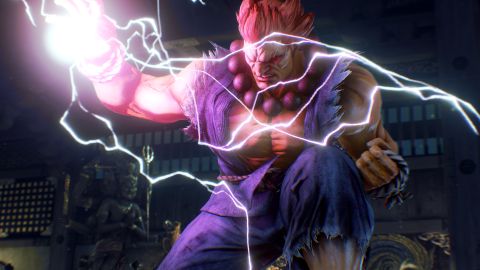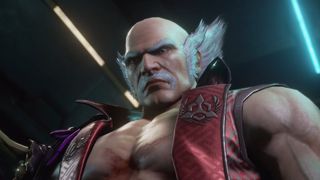GamesRadar+ Verdict
Despite some narrative missteps, Tekken 7 is still a compelling, exhilarating experience. Find the right sparring partner and it will entertain you indefinitely.
Pros
- +
Gorgeous, immediate brawling that will make you feel amazing
- +
Fine selection of characterful, varied fighters
- +
It hasn’t changed much in 20 years
Cons
- -
The story mode is disappointing
- -
It hasn’t changed much in 20 years
Why you can trust GamesRadar+
Good news! Tekken is still Tekken. Kicking people still feels great, the Mishimas are still throwing each other off cliffs, all is right with the world. But I need to be honest with you. The game’s enduring Tekken-ness is enough for me, a man of modest needs, who's happy to play 100 fights in a row with the same two boring characters. But you might rightly expect more from a modern fighting game, and that’s where Tekken 7 trips over its own espadrilles.
Let’s talk about the story mode first. If you’ve played Injustice 2 you’ll be freshly aware that fighting games can tell tales while seamlessly weaving in combat into the story. (Somewhere at NetherRealm, there is a whiteboard listing every conceivable reason for characters to beat each other senseless.) Tekken 7’s story mode, by comparison, is terrible. The Mishima Saga begins like a history lesson, throwing back to the feted day when Heihachi tossed his son Kazuya off a cliff for his own good. Because what doesn’t kill you makes you stronger, except being thrown down an effing mountain. It’s the perfect place to begin for anyone who loves Tekken, but it never delivers on that promise. Learning exactly how the Mishima family fell apart is a tantalising prospect, but it’s so badly implemented you come away feeling starved. It’s full of narrative dead ends and unnecessary characters, and the big reveals lack any emotional wallop. And I say this, in case you hadn’t guessed, as person with an unhealthy investment in the series. I get shivers seeing Heihachi crawl up the bare rock at the start of Tekken 2; I tell strangers at checkouts about the complex relationship between King and Armor King. I’m exactly the sort of person this mode should entertain, but instead I finished feeling annoyed and unfulfilled. But sadly, there’s a bigger problem.
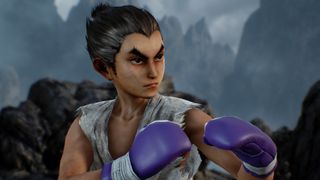
The fighting part of the story is abysmal. Many battles take place against the same character multiple times, and if you lose once you start that section again. The game attempts to ease you through by adding a modifier that lets you spam special moves, but it’s like adding stabilisers to a speedboat. Instead of understanding how Tekken works, you cheese your way through fights using specials you never properly learn. It’s a terrible introduction to the series and the system, and it’s only worth completing to grab yourself the amazingly easy Achievements / Trophies that come with it. On top of this, the Mishima Saga is a strange fit for a sequel. The new characters barely feature, squandering a cool opportunity to embed them in the Tekken mythology. Instead, you unlock additional, single-shot character stories you can play separately. These side missions are simplistic and daft - they make the character motivations in Injustice 2 look like Raging Bull - but they’re exactly what’s missing from the main story. Tekken is a cheerful, self-deprecating series, and this stuff could have added some much-needed levity to the Mishima Saga. I’m not suggesting we ditch all the patricide and frowning - just that adding the occasional angry panda could add soul to an otherwise drab tale.
Without rating them individually, the selection of new characters is imaginative and generous. Lucky Chloe and Kazumi Mishima are the standouts for me, bringing the correct mix of weirdness and threat, but most of the new additions feel like a natural fit for a game that thrives on adding wildly different fighters. Akuma also works in his surroundings, even if he feels gimmicky compared to Tekken’s more direct, lateral fighters. Overall, the roster balance is great. Most of the series favourites making a comeback, and if you’ve previously played a Tekken game you’ll find someone here you’re comfortable with. It’s a shame, however, that Lei Wulong didn’t make the cut. I’m less worried about the absence of Ganryu.
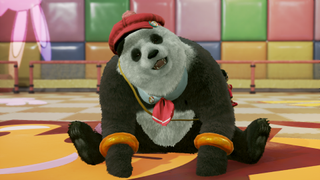
So far, the praise for Tekken 7 has been faint, so I’ll forgive you if you scrolled back up to check the score. The reason it gets four stars is because despite the shaky story mode, Tekken still feels amazing to play. And it really is about ‘feel’, in a way that most beat ‘em ups aren’t. You get the same thrill from pulling off your first big special as you do from mastering a chain throw or blocking a 10-hit combo. Matches roll back and forth brilliantly - you can perfect your opponent one round and suffer a crushing defeat the next.
I’m not suggesting we ditch all the patricide and frowning - just that adding the occasional angry panda could add soul to an otherwise drab tale.
But more than this, Tekken 7 is a game that encourages you to have fun. It’s full of wild momentum shifts and bold, cinematic fights, suitable for newcomers and veterans alike. It’s less technical than something like Street Fighter 5, but it’s also more aggressively gratifying. Whereas Street Fighter punishes you for pushing buttons, Tekken is happy to let you throw out a few testing jabs, learn what your opponent will do, and react accordingly. There are moments where you feel outclassed and powerless, but they’re eclipsed by the times when you feel empowered.
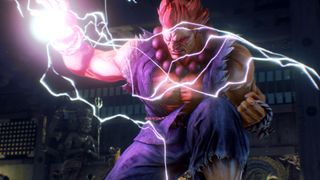
The new Rage system changes the game somewhat, but it’s implemented in a very Tekken way. As you reach the end of your health bar, you’re given a buff you can spend on special, one-shot attacks. They act rather like Street Fighter’s Super Moves, but by assigning them to characters with low health, it adds tension to the end of every fight. The psychology of it is fascinating. Connecting a Rage Art will turn a match around, but you can still take damage while you’re executing them, so they become a microcosm of Tekken’s best back-and-forth moments. There are some Tekken purists who might sneer like Bryan Fury at unnecessary tweaks to their favourite game, but for me, they add just enough frisson to justify their inclusion.
By getting excited about the core systems at the expense of everything new, I feel like I’m celebrating a game for barely evolving over the last 20 years, but Tekken has always been that good. I’d rather be playing it than writing about it. But despite this, there’s something a bit sad about Tekken 7. By trying to compete with modern beat ‘em ups, it’s simultaneously more and less than it once was, and the failure of the new additions feels jarring when compared to modern fighters. This might be the last entry for Tekken that can still trade on a that joyful fighting system alone, but for now I’m happy to enjoy it for what it is: a powerful, gratifying, deeply cinematic fighting game.
This game was reviewed on PS4.
More info
| Genre | Fighting |
| Description | Heihachi's wife reaches beyond the grave to put an end to his fighting tournament. |
| Franchise name | Tekken |
| UK franchise name | Tekken |
| Platform | "PS4","Xbox One","PS3","Xbox 360" |
| US censor rating | "Rating Pending","Rating Pending","Rating Pending","Rating Pending" |
| UK censor rating | "","","","" |
There was "no version" of Sonic 3 that wouldn't include Live and Learn according to director Jeff Fowler: "The fans would hunt me down"
Amid Oscar buzz, Zoe Saldana opens up on her new perspective on Hollywood and why she's only really proud of Avatar and Emilia Pérez: "I think I just have to accept who I am as a creative person"
The Rings of Power season 2, episode 7 is the show's version of The Two Towers – and it's the best episode of TV released all year
